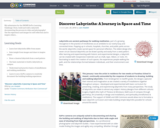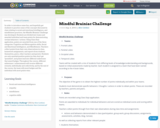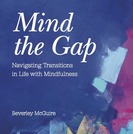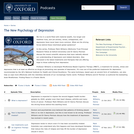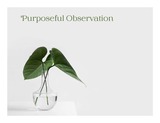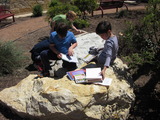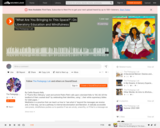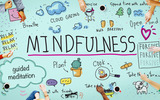In this space planning module we are going to explore taking our open learning environments to the next step beyond technology, to a richer higher level of mindfulness. It is a step away from the ledge that is catapulting students into robotic mindlessness and a lack of cognitive control. In our eagerness to connect students with technology we forget the human side of learning. Our brains function with either a perception-action, bottom-up learning cycle or a more advanced top-down goal, attention setting process. “The perception-action cycle is fed by sensory inputs from the environment—sights, sounds, smells, and tactile sensations, whose signals enter the brain via an expansive web or specialized nerves.” (21 Gazzaley) There has always been a role for our senses to play not only in learning but in survival. Enriching the sensory environment should be a goal in space design. But our ability to control the perception-action cycle or pause it is critical. “During this pause, highly evolved neural processes that underlie our goal-setting abilities come into play, the executive functions. These abilities of evaluation, decision making, organization, and planning disrupt the automaticity of the cycle and influence both perception and actions via associations, reflections, expectations and emotional weighting. This synthesis is the true pinnacle of the human mind, the creation of high level goals.” (23 Gazzaley) Creating a space for students to use all their sensory perceptions should be filled with energy. They are the spaces we have been designing in recent course modules. Now we should ask does that environment also encourage a pause; allow the individual to focus, be mindful of themselves, and learn cognitive control?We will start by looking at the scope of information and environmental overload,” the clutter”, we have dropped learners into in our schools. When technology came into libraries very little was taken out. As technology has expanded expeditiously, libraries hesitate to remove aging equipment or under used print resources allowing the environment to become dense, difficult to navigate, simply cluttered. Excessive clutter impends cognitive control and our ability to focus on finishing a goal. Before you can see the potential of a new library space we have to de-clutter, remove what is not contributing to student learning every day, and open the space to possibilities. The environment can be a partner in learning, but first obsolete elements, not contributing to K-12 learners, need to be removed. In Adam Gazzaley and Larry Rosen’s research driven book, The Distracted Mind, they explore neutral processing and how easily young minds become addicted to distractions, especially when using digital devices while rapidly scanning through text, graphics, images and auditory sounds. …three out of four K-12 teachers asserted that student use of entertainment media (including communication tools such as social media) has hurt students’ attention spans a lot or somewhat, 87 percent of teachers reported that the use of technologies is creating “an easily distracted generation with short attention spans” and 64 percent felt that “digital media do more to distract students than to help them academically”. (145, Gazzaley, Rosen) The question now becomes: Have we introduced technology too pervasively without understanding its neurological side effects to developing minds? Are our learning environments become a noisy distraction and if so how do we create more balance? We will look at design elements that can be added into the environment to shift attention back to sensory awareness and reflection. The inclusion of sensory design elements, like nature can add richness and focus to learning. Contemporary learning environments should support active, collaborative learning but also invite quiet, reflection. A “whole person” is coming into our schools and our learning spaces need to support that “wholeness.” The next evolution of educational space planning, specially libraries, should focus on linking the physical, neurological and emotional well being of the learner. We have designed educational spaces for pedagogy, for efficiency, for all the traditional educational tools and for all the new digital tools. Now it is time to focus on the whole user and our need to encourage innovative thinkers through matching innovative environments. Ellen J. Langer”s argues that “behavior depends on context.” If we want students to be creative, innovative thinkers we should pay more attention to the “context” through which they are learning. This includes the tools and the pedagogy of their learning but also the environment. We will explore Langer's concept of “sideways learning” which includes openness to novelty, alertness to distinction, sensitivity to different contexts, implicit, if not explicit, awareness of multiple perspectives and orientation in the present. Being mindful of the present, moving beyond the comfortable categories of our past and what those two concepts mean for space planning.


